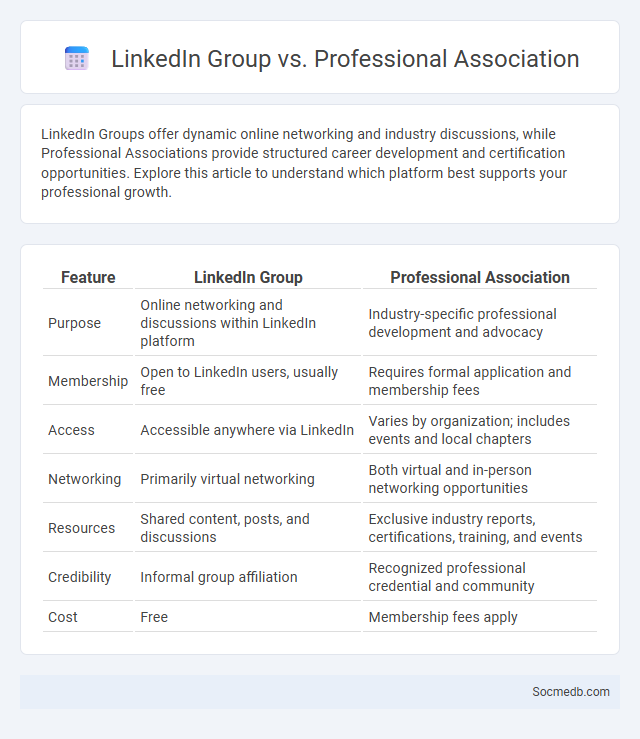
Photo illustration: LinkedIn Group vs Professional Association
LinkedIn Groups offer dynamic online networking and industry discussions, while Professional Associations provide structured career development and certification opportunities. Explore this article to understand which platform best supports your professional growth.
Table of Comparison
| Feature | LinkedIn Group | Professional Association |
|---|---|---|
| Purpose | Online networking and discussions within LinkedIn platform | Industry-specific professional development and advocacy |
| Membership | Open to LinkedIn users, usually free | Requires formal application and membership fees |
| Access | Accessible anywhere via LinkedIn | Varies by organization; includes events and local chapters |
| Networking | Primarily virtual networking | Both virtual and in-person networking opportunities |
| Resources | Shared content, posts, and discussions | Exclusive industry reports, certifications, training, and events |
| Credibility | Informal group affiliation | Recognized professional credential and community |
| Cost | Free | Membership fees apply |
Introduction: Understanding Online Professional Communities
Online professional communities are digital platforms where individuals with shared career interests connect, collaborate, and exchange industry-specific knowledge. These communities foster networking opportunities, skill development, and access to job resources, enhancing professional growth. Platforms such as LinkedIn, industry forums, and specialized groups play a crucial role in building expertise and expanding professional influence.
The Role of LinkedIn Groups in Networking
LinkedIn Groups serve as a vital platform for professionals to connect, share expertise, and foster meaningful industry relationships. Engaging actively in these groups enhances your visibility and access to targeted networking opportunities, accelerating career growth. Leveraging LinkedIn Groups allows you to exchange insights, discover job leads, and collaborate with like-minded experts in your field.
What Are Professional Associations?
Professional associations are organizations that bring together individuals from a specific industry or profession to collaborate, share resources, and advance their field. These associations often provide networking opportunities, continuing education, certification programs, and industry-related information to help members enhance their skills and professional development. Engaging with professional associations on social media platforms allows members to stay informed about industry trends, participate in discussions, and connect with peers worldwide.
Exploring the Power of Niche Communities
Niche communities on social media leverage shared interests to create highly engaged and loyal audiences, driving targeted interactions and meaningful connections. Platforms like Reddit, Discord, and specialized Facebook groups enable users to exchange insights, support, and content relevant to specific hobbies, professions, or lifestyles. These focused networks amplify brand visibility and foster authentic engagement by aligning messaging with the community's unique values and needs.
Membership Requirements and Accessibility Comparison
Membership requirements for social media platforms typically include age verification, account creation with valid email or phone number, and adherence to community guidelines to ensure user safety. Accessibility features vary widely, with platforms like Facebook and Twitter offering screen reader support, text resizing, and keyboard navigation, while others may lack comprehensive accommodations for users with disabilities. Comparing accessibility, platforms integrating AI-powered tools for real-time captioning and voice commands provide a more inclusive experience, highlighting the importance of continuous development in social media usability.
Value Proposition: Content, Events, and Resources
Your social media strategy hinges on delivering high-value content, exclusive events, and actionable resources that foster community engagement and brand loyalty. Curated content tailored to your audience's interests drives meaningful interactions and increases visibility across platforms. Exclusive events and resource-sharing position your brand as an authoritative source, enhancing trust and long-term customer retention.
Engagement and Interaction Levels
High engagement and interaction levels on social media significantly boost your brand's visibility and credibility, fostering a loyal community. Metrics such as likes, comments, shares, and direct messages provide valuable insights into audience preferences and content effectiveness. Consistently analyzing these interactions helps tailor your strategy to maximize reach and deepen user connection.
Career Growth and Industry Exposure
Leveraging social media platforms like LinkedIn, Twitter, and industry-specific forums can significantly boost your career growth by connecting you with key professionals and recruiters in your field. Sharing insightful content and engaging in relevant discussions enhances your industry exposure, positioning you as a knowledgeable and active member within your sector. Regularly updating your profiles with achievements and skills ensures you remain visible to potential employers and collaborators seeking expertise.
Costs, Commitment, and ROI Analysis
Social media marketing requires careful assessment of costs, including advertising budgets, content creation expenses, and management tools subscriptions. Commitment to consistent posting schedules and audience engagement ensures sustained brand visibility and community growth. Detailed ROI analysis tracks conversions, customer acquisition costs, and lifetime value to optimize campaign effectiveness and justify investment decisions.
Choosing the Right Platform for Your Professional Goals
Selecting the appropriate social media platform depends heavily on your professional objectives and target audience demographics. LinkedIn excels for B2B networking, job searching, and industry expertise sharing, while Instagram and TikTok favor creative visual content and brand awareness among younger demographics. Prioritizing platforms that align with your industry standards and engagement metrics maximizes professional growth and return on investment.
 socmedb.com
socmedb.com